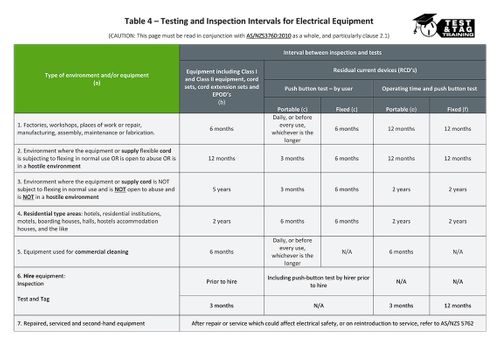- Home /
- Test & Tagging Guidelines | Rapid Clean Newcastle
Shop Now
- Air Movers & Dehumidifiers
- Automotive Care
- Bin Liners
- Bulk Deals
- Carpet Cleaning Chemicals
- Carpet Extractors
-
Cleaning Chemicals
- Acid Cleaners
- Air Fresheners & Odour Control
- Aircon Cleaning Chemical
- Bathroom Cleaning Chemicals
- Carpet Cleaning Chemicals
- CHEMICAL DISPENSERS
- Degreaser Chemicals
- Descaler Chemicals
- Disinfectant Chemicals
- Fire Iron & Rust Removal
- Floor Care & Maintenance
- Floor Cleaning Chemicals
- Furniture Cleaning Chemicals
- General Cleaning Chemicals
- Graffiti Removers
- Kitchen Cleaning Chemicals
- Laundry Detergents & Softeners
- Leather Cleaners
- Metal & Steel Cleaners
- Mould Removal Chemicals
- Sanitisers & Sanitising Agents
- Spa Cleaning Chemicals
- Spray & Wipe Chemicals
- Stain Removal Chemicals
- Tile Cleaning Chemicals
- Window Cleaning Chemicals
- Enviro Friendly Products
- Equipment Hire
- Floor Care & Maintenance
- Floor Sanders
- Gloves
- Hand Dryers
- Hospitality
- Hotel/Motel Guest Supplies
- Janitorial Products
- Machine Spares & Accessories
- Mats and Matting
- Microfibre Cloths/Pads/Holders
- Paper Products
- Polishers & Burnishers
- Pressure Washers
- Protective Clothing
- Scrapers & Blades
- Scrubbers
- Steamers and Steam Cleaners
- Sweepers
- Vacuum Accessories & Bags
- Vacuum Cleaners
-
Washroom Supplies
- Air Fresheners-Cans & Refills
- Body Wash & Shampoos
- Facial Tissues
- Hand Soap
- Hand Soap Dispensers
- Hand Towel
- Hand Towel Dispensers
- Insecticides & Bug Repellants
- Plungers
- Protective Hand Creams
- Sanitary Bins & Consumables
- Sanitisers & Sanitising Agents
- Toilet Bowl Clips
- Toilet Paper
- Toilet Paper Dispensers
- Urinal Screens
- Window Cleaning
- Wipes
Blog Archives
Blog Categories
Electrical inspection and testing
Certain types of electrical equipment must be regularly inspected and tested by a competent person to identify damage, wear and detect electrical faults.
If you are a business or employer (or other PCBU) you must make sure that electrical equipment is regularly inspected and tested by a competent person if the electrical equipment:
- is supplied with electricity through an electrical socket outlet ('plug in' equipment), and
- used in an environment in which its normal use exposes the equipment to operating conditions that are likely to result in damage to the equipment or a reduction in its expected life span, eg conditions such as exposure to moisture, heat, vibration, mechanical damage, corrosive chemicals or dust
'Competent person' for inspection and testing
A competent person is someone who has acquired - through training, qualification or experience - the knowledge and skills to carry out inspections and testing of electrical equipment.
The relevant Australian standards are:
- AS/NZS 3760: 2010 - In service safety inspection and testing of electrical equipment, outlines inspection, testing and tagging methods
- AS/NZS 3012: 2010 - Electrical installations - Construction and demolition sites, outlines regular inspection and testing requirements.
Regular testing requirements
The frequency of inspection and testing will vary depending on the nature of the workplace and the risks associated with the electrical equipment. The AS/NZS 3760: 2010 - In service safety inspection and testing of electrical equipment, outlines inspection, testing, tagging methods and frequency.
Details of the required frequency for inspection and testing on construction sites are set out in Australian standard AS/NZS 3012: 2010 Electrical installations - Construction and demolition sites.
Record of testing results
A record of testing must be kept until the electrical equipment is next tested, permanently removed from the workplace or disposed of. A record of testing must specify:
- the name of the person who carried out the testing
- the date of the testing
- the outcome of the testing
- the date on which the next testing must be carried out.
The record may be in the form of a tag attached to the electrical equipment tested

